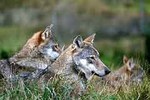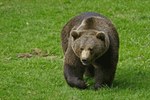News
Crying wolf?
Sheep farmers have achieved their aim: six wolves were released into the wild for killing in the French department of Savoy, while at the national level the easing of protected status is to be discussed. Early in September the farmers had held captive the president, the director and an employee of the Vanoise National Park for fifteen hours. While politics is now breathing down the neck of the wolf, the hostage-takers got away scot-free.
Environmental groups acknowledge that the return of the wolf presents farmers with certain challenges, but that a better and more comprehensive solution is required than mere culling. Wolves are not the cause of the problems in the Alps, but in France simply reveal the problems of farming in general and of animal husbandry in particular, states Marc-Jerôme Hassid, executive director of CIPRA France. “It is the farming model that is sick and needs to be rethought to permit the cohabitation of humans and nature.”
Local hunters set the agenda
In Switzerland the protected status of wolves living in packs was recently relaxed, just before a second pack appeared in the canton of Ticino. There also exists controversy regarding the rule that cantons may decide for themselves whether the statutory conditions for culling have been met. The canton of Valais immediately exercised its right, punishing a wolf for its raids even though the flocks of sheep it had attacked were inadequately protected. Yet a survey carried out in the canton of Graubünden (Grisons), where Switzerland’s second wolf pack lives, shows that the population mostly favours a natural reintroduction of this large predator.
Solutions for co-existence
The Alpine countries have repeatedly expressed their approval for co-existence between humans and large carnivores, inter alia in the Alpine Convention, the Berne Convention and the EU’s fauna-flora habitat directive. Implementation of this commitment requires protection of flocks and herds, compensation schemes, monitoring and the raising of the awareness of the population. CIPRA is also increasing the latter with a contribution at its 2015 annual conference from Duccio Berzi, chairman of Canislupus Italia, a mediator in conflicts in Italy involving wolves and livestock farming.
Source and further information:
http://www.cipra.org/de/dossiers/grossraubtiere (de)
http://www.pronatura.ch/news-de/items/wolf-im-wallis-abschussbewilligung-nicht-rechtens (de)
http://www.pronatura.ch/news-fr/items/autorisation-de-tir-illicite-dun-loup-en-valais (fr)





